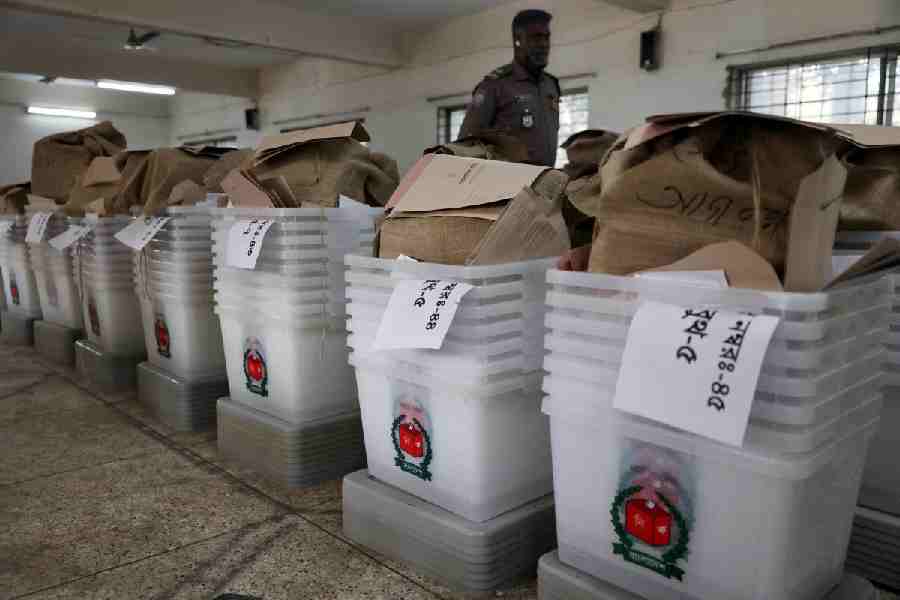London, June 22: A direct descendant of Robert Clive spoke exclusively to The Telegraph today about the continuing “love affair between Britain and India” on the eve of the 250 th anniversary of the Battle of Plassey.
Baroness Darcy de Knayth, recalled her first and only trip to India in 1998, and said: “I am a direct descendant.”
She was not entirely sure how many “greats” she had to specify but confirmed: “Robert Clive was my great, great, great, great, great grandfather.”
Lady Darcy, as Davina Marcia Ingrams is formally addressed, went to India with Baroness Shreela Flather, the first Indian woman in the House of Lords whose travelling party included the descendants of Lutyens, Elgin, Brabourne, Lawrence, Reading, Lytton — and Robert Clive.
The trip began in Delhi, took in the Taj Mahal in Agra and moved to Jaipur where Lady Darcy saw dawn breaking for the first time. She recalled the “absolutely magical moment at 4.30-5 in the morning” which has remained “seared in my memory — the birds and crows were flapping about on a lake”.
“You have only to breathe the air of India for the first time and you are hooked,” she admitted.
She was reassured by an Indian woman: “Even if you go to Calcutta, you won’t be pelted with rotten tomatoes.”
Lady Darcy, who sits in the House of Lords as a Crossbencher (meaning she is not aligned with any political party), confessed: “As a descendant of Robert Clive, I felt a little embarrassed. The Lutyens and the Lawrences were the good guys. But I was never made to feel unwelcome.”
As a disabled person confined to a wheelchair — her disabilities have intensified since 1998 — her trip was even more challenging. But Lady Darcy’s understanding of and affection for India has grown over the years.
“I feel there are warm feelings between Britain and India, a partnership, but India is now leading the way,” she said.
According to historical notes: “The Battle of Plassey (Bengali Pôlashir Juddho) took place on June 23, 1757, at Palashi, India, on the banks of the Bhagirathi River, about 150 km north of Calcutta, near Murshidabad, then the capital of the Nawab of Bengal. The opponents were Siraj-Ud Daulah, the last independent Nawab of Bengal, and the British East India Company.”
The notes go on: “Siraj-Ud-Daulah’s army commander, Mir Jafar, defected to the British, causing his army to collapse. As a result, the entire province of Bengal fell to the company. The enormous wealth gained from the Bengal treasury allowed the company to significantly strengthen its military might. Today, Plassey is judged to be one of the pivotal battles leading to the formation of the British Empire in India.”
“Major-General Robert Clive, 1st Baron Clive of Plassey, KB (29 September 1725-22 November 1774), also known as Clive of India, was the soldier of fortune and commander who established the military supremacy of the East India Company in southern India and Bengal. He is widely regarded as a key figure in the establishment of British India,” the book also says.
While Lady Darcy’s feelings for India are emotional, those of the historian Nick Robins are much more analytical.
Robins, who works in the field of ethical investments in London, published his book, The Corporation that Changed the World: How the East India Company Shaped the Modern Multinational, last year.
Today, he said he had figures which showed how India became a poor country and Britain much richer due to changes triggered by Plassey. Clive’s contribution was to cause an internal collapse in the rival army by triggering defections and betrayals.
In 1600, Britain’s share of global GDP was 1.8 per cent, compared with China’s 29 per cent and India’s 22.5 per cent. By 1700, this had changed to 2.8 per cent for Britain, while China’s was 22 per cent and India’s 29 per cent.
By 1870, only 13 years after Plassey, Britain had improved its share to 9 per cent, China’s had fallen to 17 per cent and India’s had halved to 12 per cent.
India’s decline continued.
“The flow of bullion from Britain to India for the purchase of textiles, cotton and luxury goods stopped after Plassey,” said Robins. “Bengal was run for the benefit of the Company and for the British Empire as a whole. The Battle of Plassey allowed the Company to manipulate the economy of Bengal.”
Earlier this week, Amartya Sen, the Nobel Prize winning economist, spoke at a function in London which brought together Bangladesh, Pakistan and the Indian communities to mark the anniversary of the Battle of Plassey.
The function also launched the new Cambridge IGCSE Indian, Bangladesh and Pakistan Studies syllabuses, which have been developed by the University of Cambridge International Examinations (CIE) in consultation with teachers in south Asia.
Students learn about their “rich heritage and cultural influences, and about events which have shaped national identity”, including Plassey.
University of Cambridge International Examinations (CIE) is the world’s largest provider of international qualifications for 14-19 year olds. CIE qualifications are taken in 150 countries.
Ann Puntis, CIE’s chief executive, said: “We would be delighted to make these Cambridge IGCSEs available to students in Bangladeshi, Indian and Pakistani communities here in the UK. Around the world, schools find that these subjects add something very valuable to the curriculum.”











